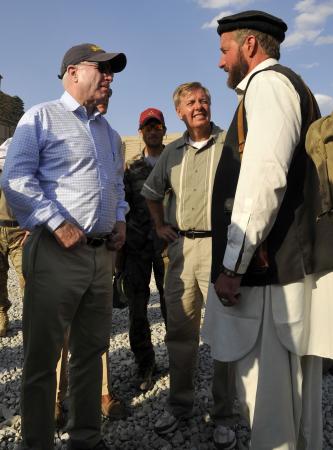When the promise of the miraculous is disappointed
Saturday, March 21st, 2015[ by Charles Cameron — the role of promise and illusion in recruitment, disappointment and disillusion in CVE ]
.
Here’s an example of promise and disillusionment from the early Afghan jihad: upper quote below from Abdullah Azzam, lower quote from Mustafa Hamid.
**
It seems that disappointed hopes are and/or should be a major focus in countering violent extremism, ie places where the jihadist recruitment “narrarive” fails when it comes in contact with ground reality. Because a caliphate that is losing ground is no caliphate. Because a caliphate that diverges from its own ideals and standards is no caliphate. Because the food is terrible, or battle turns out to be more real than bargained for:
[ order of these two NYT paragraphs reversed here at Zenpundit ]
During nearly a year in contact with New York Times reporters, Abu Khadija expressed gradually growing discontent. His grievances ranged from relatively mundane issues like eating canned food and being deployed to a front line far from his family because of a lack of fighters, to discomfort with the group’s strategic priorities and its extreme violence.
“I can’t eat, I feel I want to throw up, I hate myself,” he said, adding that the executioners had argued over who would wield the knives and finally settled the issue by lottery. “Honestly, I will never do it. I can kill a man in battle, but I can’t cut a human being’s head with a knife or a sword.”
Jessica Stern makes a similar point on NPR:
I think that we need to hear a lot more from people who leave ISIS – somebody who says, gosh, I joined. I thought I was going to be making the world a better place, and it turned out that it really wasn’t what I imagined, that there were atrocities that I didn’t want to be involved in. There are people who are saying that. We need to amplify those messages.
**
The quote in the upper panel of the DoubleQuote above comes from Azzam’s collection, The Signs of Ar-Rahmaan in the Jihad of Afghanistan. There are many miracles (both mujizat and karamat) described there. Among them, one of the most interesting to me concerns the Miraj and al-Aqsa mosque:
Informing the people of the details of Baitul Maqdis after the night of Me’raaj.
Rasulullah sallAllaahu alayhi wa sallam said: When the people denied (the Me’raaj), Allaah Ta’ala revealed the Baitul Maqdis to me and I informed the people of its details whilst looking at it.”
The Miraj was the prophet’s night journey to the Noble Sanctuary / Temple Mount (Bait al-Maqdis) in Jerusalem, from whence he ascended the heavens and was given the instructions for Muslim prayer. The Noble Sanctuary was Islam’s first Qibla or direction of focus in prayer.
The quote in the lower panel above comes from Mustafa Hamid in his forthcoming book with Leah Farrall, The Arabs at War in Afghanistan. In it, Hamid illustrates both the spiritual aspirations and disappointed hopes at play in that earlier jihad.
I have discussed Azzam’s and others’ descriptions of miracles previously in such posts as Of war and miracle: the poetics, spirituality and narratives of jihad, Azzam illustrates Levi-Strauss on Mythologiques, and Gaidi Mtaani, the greater scheme of things. Such stories are profoundly moving to those who are open to believing them.
In Mustafa Hamid’s words, we see the equal and opposite influence unleashed when such stories, offered as promises in recruitment, prove unsubstantiated by reality.
A hat-tip to Myra MacDonald, who pointed me to this quote.
_______________________________________________________________________________________________________
Side note:
Students of comparative religion may find the following paragraphs, quoted in the Azzam compilation from the Deobandi scholar Ashraf Ali Thanwi of interest:
Karaamaat and Mu’jizah do not occur by a person’s design — that whenever the Nabi or Wali wishes he can execute such an act. Such acts only occur when Allaah Ta’ala in His Infinite Wisdom wishes to exhibit the act. It then occurs whether a person desires it or not.]
A karaamah does not indicate that the person performing such an act is better than others. In fact, sometimes the karaamah decreases his status in the sight of Allaah, due to fame and vanity entering his heart. It was for this reason that many of the pious personalities used to make istighfaar (seek forgiveness) when a karaamah would manifest itself at their hands, just as they would make istighfaar when sins are committed
The statement “It then occurs whether a person desires it or not” reminds me, for instance, of the tale told of St Teresa of Avila, friend and colleague of St John of the Cross:
Legend tells it that as Teresa was in the choir singing among her sisters one day, she began to levitate. When the other nuns started to whisper and point, Teresa lowered her gaze and realized that she had risen several inches above the stone floor. “Put me down!” she demanded of God. And he did.
There’s a deeper truth hidden in St Teresa’s request, I suspect: grace is not taken, it is given.










